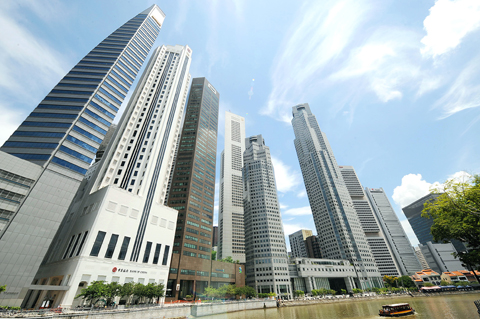Singapore’s central bank devalued its currency less aggressively than expected in a monetary policy review yesterday, signaling growing confidence that the global economy is bottoming out.
The Monetary Authority of Singapore repeated what it had done in previous downturns in 2002 and 2003 by shifting the center of the secret trade-weighted band for the Singapore dollar down to the existing level of the exchange rate basket, effectively a devaluation.
Based on their estimates of the policy band the Singapore dollar is managed in, economists said the currency might have been devalued by 1.5 percent to 2 percent.

PHOTO: AFP
Yesterday’s monetary easing came as Singapore’s economy contracted a record 11.5 percent from a year earlier in the first quarter of this year, more than a market median forecast of an 8.8 percent slump. The government expects the economy to shrink between 6 percent and 9 percent this year.
The bank said the economy is likely to remain below its potential growth rate until a decisive recovery in exports.
The policy easing appeared inadequate to most analysts. JPMorgan Chase strategist Claudio Piron said the Monetary Authority of Singapore had been conservative.
“There had been some expectation that the re-centering would be as much as a 400 basis points depreciation,” he said.
Others pointed to subtle hints of optimism in the central bank’s statement, such as the allusions to Singapore’s “sound fundamentals,” and references to a pick up in leading indicators and improved consumption in the US.
“The statement was somewhat optimistic with the usual dose of cautiousness,” said Emmanual Ng, strategist at OCBC Bank.
Other data yesterday meanwhile suggested Singapore’s open economy — exports including re-exports are double the total economic output — could be nearing a trough.
Non-oil exports (NODX) fell 17 percent from a year earlier last month after a record 35 percent plunge in January and a 24 percent fall in February. Shipments to China jumped 14 percent last month.
“Although we are seeing some faint heartbeats in the Singapore economy with better-than-expected March NODX numbers, we have not seen the bottom yet,” said Song Seng Wun (宋誠煥), economist at Malaysian bank CIMB in Singapore. “With inflation easing and external demand fragile, the shift in policy remains appropriate.”
“Given all these horrendous numbers, this policy change is not a big surprise. It is reflecting the free fall in external demand,” Song said.
The Singapore dollar, which has been emerging Asia’s second-worst performing currency this year, strengthened to a two-month high of S$1.497 against the US dollar from S$1.515 before the announcement, and was trading at S$1.5005 by 0600 GMT.

Nvidia Corp yesterday unveiled its new high-speed interconnect technology, NVLink Fusion, with Taiwanese application-specific IC (ASIC) designers Alchip Technologies Ltd (世芯) and MediaTek Inc (聯發科) among the first to adopt the technology to help build semi-custom artificial intelligence (AI) infrastructure for hyperscalers. Nvidia has opened its technology to outside users, as hyperscalers and cloud service providers are building their own cost-effective AI chips, or accelerators, used in AI servers by leveraging ASIC firms’ designing capabilities to reduce their dependence on Nvidia. Previously, NVLink technology was only available for Nvidia’s own AI platform. “NVLink Fusion opens Nvidia’s AI platform and rich ecosystem for

WARNING: From Jan. 1 last year to the end of last month, 89 Taiwanese have gone missing or been detained in China, the MAC said, urging people to carefully consider travel to China Lax enforcement had made virtually moot regulations banning civil servants from making unauthorized visits to China, the Control Yuan said yesterday. Several agencies allowed personnel to travel to China after they submitted explanations for the trip written using artificial intelligence or provided no reason at all, the Control Yuan said in a statement, following an investigation headed by Control Yuan member Lin Wen-cheng (林文程). The probe identified 318 civil servants who traveled to China without permission in the past 10 years, but the true number could be close to 1,000, the Control Yuan said. The public employees investigated were not engaged in national

CAUSE AND EFFECT: China’s policies prompted the US to increase its presence in the Indo-Pacific, and Beijing should consider if this outcome is in its best interests, Lai said China has been escalating its military and political pressure on Taiwan for many years, but should reflect on this strategy and think about what is really in its best interest, President William Lai (賴清德) said. Lai made the remark in a YouTube interview with Mindi World News that was broadcast on Saturday, ahead of the first anniversary of his presidential inauguration tomorrow. The US has clearly stated that China is its biggest challenge and threat, with US President Donald Trump and US Secretary of Defense Pete Hegseth repeatedly saying that the US should increase its forces in the Indo-Pacific region

ALL TOGETHER: Only by including Taiwan can the WHA fully exemplify its commitment to ‘One World for Health,’ the representative offices of eight nations in Taiwan said The representative offices in Taiwan of eight nations yesterday issued a joint statement reiterating their support for Taiwan’s meaningful engagement with the WHO and for Taipei’s participation as an observer at the World Health Assembly (WHA). The joint statement came as Taiwan has not received an invitation to this year’s WHA, which started yesterday and runs until Tuesday next week. This year’s meeting of the decisionmaking body of the WHO in Geneva, Switzerland, would be the ninth consecutive year Taiwan has been excluded. The eight offices, which reaffirmed their support for Taiwan, are the British Office Taipei, the Australian Office Taipei, the